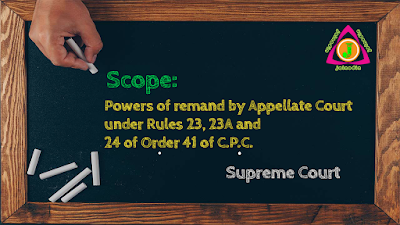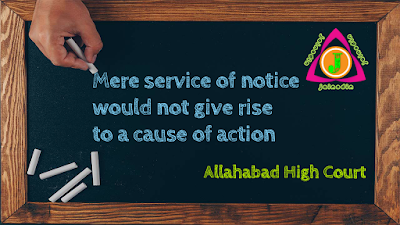It is also now a well-settled principle of law that mentioning of a wrong provision or non-mentioning of any provision of law would, by itself, be not sufficient to take away the jurisdiction of a court if it is otherwise vested in it in law. Wile exercising its power, the court will merely consider whether it has the source to exercise such power or not. The court will not apply the beneficent provisions like Sections 5 and 14 of the Limitation Act in a pedantic manner. When the provisions are meant to apply and in fact found to be applicable to the facts and circumstances of a case, in our opinion, there is no reason as to why the court will refuse to apply the same only because a wrong provision has been mentioned. In a case of this nature, Sub-section (2) of Section 14 of the Limitation Act per se may not be applicable, but, as indicated hereinbefore, the principles thereof would be applicable for the purpose of condonation of delay in terms of Section 5 thereof.[Para No.14]
Showing posts with label jurisdiction. Show all posts
Showing posts with label jurisdiction. Show all posts
20 November 2020
06 August 2020
Civil suit shall proceed de novo if paint is returned for presentation in proper court
Modern Construction (supra), referred to the consistent position in law by reference to Ramdutt Ramkissen Dass vs. E.D. Sassoon & Co., Amar Chand Inani vs. The Union of India, Hanamanthappa vs. Chandrashekharappa, (1997) 9 SCC 688, Harshad Chimanlal Modi (II) (supra) and after also noticing Joginder Tuli (supra), arrived at the conclusion as follows:
“17. Thus, in view of the above, the law on the issue can be summarised to the effect thatif the court where the suit is instituted, is of the view that it has no jurisdiction, the plaint is to be returned in view of the provisions of Order 7 Rule 10 CPC and the plaintiff can present it before the court having competent jurisdiction. In such a factual matrix, the plaintiff is entitled to exclude the period during which he prosecuted the case before the court having no jurisdiction in view of the provisions of Section 14 of the Limitation Act, and may also seek adjustment of court fee paid in that court. However, after presentation before the court of competent jurisdiction, the plaint is to be considered as a fresh plaint and the trial is to be conducted de novo even if it stood concluded before the court having no competence to try the same.”
Joginder Tuli (supra) was also noticed in Harshad Chimanlal Modi (II) (supra) but distinguished on its own facts.[Para No.16]
We find no contradiction in the law as laid down in Modern Construction (supra) pronounced after consideration of the law and precedents requiring reconsideration in view of any conflict with Joginder Tuli (supra). Modern Construction (supra) lays down the correct law. We answer the reference accordingly.[Para No.17]
19 June 2020
Divorced Muslim woman cannot claim maintenance under Section 125 of the Cr.P.C. from her husband
Muslim divorced wife - entitlement of maintenance - sec.125 of CrPC - Sec. 3 of the Muslim Women (Protection of Rights on Divorce) Act, 1986 - jurisdiction and power of family court to convert an application filed u/s.125 of CrPC into an application u/s. 3 of the Muslim Women (Protection of Rights on Divorce) Act, 1986.
Held: A divorced Muslim woman cannot claim maintenance under Section 125 of the Cr.P.C. from her husband after the enactment of the 1986 Act for Muslim Women. However, under Section 3 read with Section 4 of the 1986 Act for Muslim Women, a divorced Muslim woman is entitled to an order of maintenance, if she is unable to maintain herself after the Iddat period and has not remarried.
Family Court would have jurisdiction under Section 7 of the Family Courts Act to entertain an application under Section 3 and 4 if The Muslim Women (Protection of Rights on Divorce) Act, 1986.
It is now settled that a divorced Muslim woman cannot claim maintenance under Section 125 of the Cr.P.C. from her husband after the enactment of the 1986 Act for Muslim Women. However, under Section 3 read with Section 4 of the 1986 Act for Muslim Women, a divorced Muslim woman is entitled to an order of maintenance, if she is unable to maintain herself after the Iddat period and has not remarried. Section 5 of the 1986 Act for Muslim Women provides that a divorced woman and her former husband might decide by an affidavit or any other declaration in writing, that they would prefer to be governed by the provisions of Section 125 to 128 of the Cr.P.C.[Para No.56]
Sub-section (2) of Section 3 is an enabling provision which enables a divorced Muslim woman to make an application to a Magistrate for an order for payment of maintenance or mehr or dower or delivery of properties, as the case may be. The non- obstante clause is restricted to sub-section (1) of Section 3 and does not cover sub-section (2) of Section 3 of the 1986 Act for Muslim Women. There is no conflict between Section 3(2) of the 1986 Act for Muslim women and the Family Courts Act. On the other hand, Section 20 of the Family Courts Act, 1984 gives overriding effect to the Family Courts Act notwithstanding anything therewith contained in any other law in force. The Family Court is to exercise all the jurisdiction exercisable by any District Court or any other subordinate Civil court in respect of a proceeding for maintenance.
05 May 2020
Mere service of notice would not give rise to a cause of action
Cause of action' implies a right to sue. The material facts which are imperative for the suitor to allege and prove constitutes the cause of action. It has been interpreted to mean that every fact which would be necessary for the plaintiff to prove, if traversed, in order to support his right to the judgment of the Court. [Para No.20]
As cause of action is the bundle of facts to examine the issue of jurisdiction it is necessary that one of the interlinked fact must have occurred in a place where the case has been instituted. All necessary facts must form an integral part of the cause of action. The fact must have direct relevance in the lis involved. It is not that every fact pleaded can give rise to a cause of action so as to confer jurisdiction on the Court in whose territorial jurisdiction it has occurred.[Para No.21]
Legal words:
cause of action,
civil,
facts,
high court,
Interpretation of statute,
jurisdiction,
notice,
right
03 May 2020
Family Court has jurisdiction to award permanent alimony to Muslim wife while granting the decree of divorce in her favor
The point to be stressed is that the relief of maintenance whether to the wife or the children is incidental to the relief of 'dissolution of marriage'. Merely because 'The Dissolution of Muslim Marriages Act, 1939', does not mention that the Court is also having the jurisdiction or power to grant such relief, it cannot be said that the Court is not having the jurisdiction to grant it, if it is incidental, claimed and the Court finds it necessary to grant the same. Moreover, the right of maintenance given to wife and the minor children under the provisions of the Muslim Women (Protection of Rights on Divorce) Act, 1986, is in addition to the right, which the minor children are having under Muslim Law to get maintenance from the father.
The law expects that the parties should not be driven to approach the different forums but in one forum itself they should be granted whatever reliefs to which they are entitled.[Para No.56]The provision for permanent alimony is incidental to the granting of a decree or judicial separation, divorce or annulment of marriage. In other words, the relief of permanent alimony is a relief incidental to the granting of the substantive relief by the Court in the main proceeding.[Para No.79]

The right of maintenance and right in the matrimonial property are the consequences of the marriage or its dissolution. Those reliefs are incidental to the main relief of 'dissolution of marriage' and therefore, these reliefs are very much an integral part of the decree of 'dissolution of marriage'. The Law contemplates that the husband has two separate and distinct obligations; (I) to make "reasonable and fair provision" for his divorcee wife and (ii) to provide "maintenance" for her. The obligation to make a reasonable and fair provision for the divorced wife is not restricted until the divorced wife remarries. It is within the jurisdiction of the Family Court to pass an order for a lump sum amount to be paid to the wife in discharge of the obligation of the husband under Section 3(1)(a) of the Act, 1986 and such order cannot be modified upon remarriage of the divorced Muslim wife.
The provision for permanent alimony is incidental to the granting of a decree or judicial separation, divorce or annulment of marriage.
When the Family Court makes an order of permanent alimony or for one time payment in the proceedings instituted by the wife for divorce, it is not founded on any stipulation that any part of the sum would be refunded either in whole or in part. Such sum is not granted on the condition against remarriage for all times to come or for any particular period. It is something different from the obligation to her husband to maintain his divorced wife for his life or until remarried. The permanent alimony in a way is an estimated sum in lump sum to discharge the husband from her future liabilities unconditionally.[Para No.80]
Gujarat High Court
Tarif Rashidbhai Qureshi
Vs.
Asmabanu Alimohmmad Idarbhai Qureshi
Decides on 19/03/2020
Legal words:
alimony,
civil,
divorce,
family court,
high court,
judicial separation,
jurisdiction,
maintenance
30 April 2020
Better financial resources of a parent, though relevant, cannot act as sole criteria for determining the claim of the custody of the child
While considering the claim of custody of a child, the Court acts in parens patriae jurisdiction and is to be governed solely by the consideration of the welfare of the child. In claim of custody of a child, the claim of Guardianship under Section 6 of the Act or better financial resources of a parent or lack of any adverse material against a parent or the fact that the parent truly loves the child and has the welfare of the child in mind, though relevant, cannot act as sole criteria for determining the welfare of the child and consequently the claim of the custody of the child.[Para No.18]
25 April 2020
Scope of powers of remand by Appellate Court under Rules 23, 23A and 24 of Order 41 of C.P.C.
A conjoint reading of Rules 23, 23A and 24 of Order XLI brings forth the scope as also contours of the powers of remand that when the available evidence is sufficient to dispose of the matter, the proper course for an Appellate Court is to follow the mandate of Rule 24 of Order XLI CPC and to determine the suit finally. It is only in such cases where the decree in challenge is reversed in appeal and a re-trial is considered necessary that the Appellate Court shall adopt the course of remanding the case. It remains trite that order of remand is not to be passed in a routine manner because an unwarranted order of remand merely elongates the life of the litigation without serving the cause of justice. An order of remand only on the ground that the points touching the appreciation of evidence were not dealt with by the Trial Court may not be considered proper in a given case because the First Appellate Court itself is possessed of jurisdiction to enter into facts and appreciate the evidence. There could, of course, be several eventualities which may justify an order of remand or where remand would be rather necessary depending on the facts and the given set of circumstances of a case.

Remand would arise only when the factual findings of Trial Court are reversed and a re-trial is considered necessary by the Appellate Court. [Para No.25.4]
23 April 2020
Does Family Court have jurisdiction in respect of dispute where marriage is not solemnized as per law
Love relationship developed between Male petitioner and female respondent belonging to different cast. They without actually performing marriage secured a false certificate from an institution indicating that they have solemnized the marriage. On the basis of such certificate they obtained marriage certificate from Municipal Corporation. After disclosure to their respective families FIR for the offences punishable under Sections 464, 465, 466, 468, 471 read with 34 of the Indian Penal Code as well as for the offence punishable under the Maharashtra Regulations of Marriage Bureau and Registration Act, 1998 came to be registered.

Applicant-male filed petition in Family Court for seeking declaration that he is unmarried and that the marriage certificate to be null and void. The prayer is not objected by Respondent-female; still Family Court observed that the jurisdiction of Family Court can be invoked if someone is married as per law and dismissed that petition on the ground ground that it lacks jurisdiction to entertain the petition.
Held:
Conjoint reading of sections 7 and 8 of the Family Courts Act makes it clear that the jurisdictions covered under section 7 of the Act are excluded from the purview of jurisdiction of civil court.
Legal words:
civil,
declaration,
family court,
high court,
illegal marriage,
jurisdiction,
Love relationship,
null and void
Subscribe to:
Comments (Atom)





